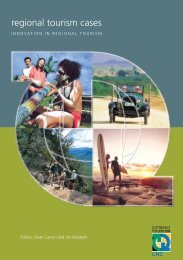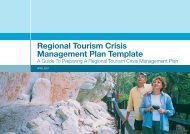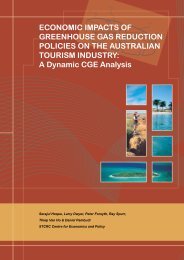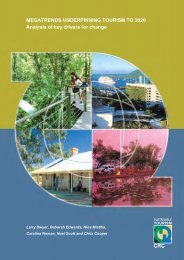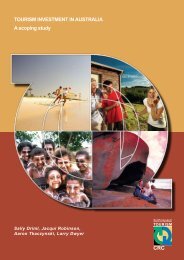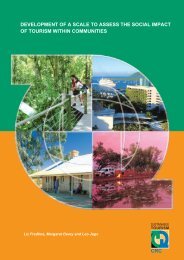Tourism Risk Management - Sustainable Tourism Online
Tourism Risk Management - Sustainable Tourism Online
Tourism Risk Management - Sustainable Tourism Online
Create successful ePaper yourself
Turn your PDF publications into a flip-book with our unique Google optimized e-Paper software.
the form of information that is required for decision-making purposes: this is what we know, now what<br />
do we have to do about it?<br />
Once made, decisions must be distributed to all those who have a need to know which may include<br />
visitors, government and community agencies, and the general public via the media.<br />
<strong>Tourism</strong> Business Continuity<br />
Business continuity is a key issue of crisis response management and a destination should aim, as<br />
far as practicable, to maintain normal services to visitors and operators wherever possible. Business<br />
continuity issues to be considered by the crisis management team include:<br />
• identification of visitors’ needs and the provision of essential support services;<br />
• priorities for restoration of facilities, services and infrastructure;<br />
• resources and budget requirements;<br />
• tactical (short-term) and strategic (longer-term) business issues;<br />
• media management;<br />
• public relations issues and arrangements;<br />
• consultation with government/politicians/community leaders;<br />
• environmental management issues; and<br />
• alternative means and sites of operation.<br />
4. Recovery<br />
The crisis management strategy of recovery is concerned with the restoration and rehabilitation of<br />
regional tourism and its return to full functioning. Business continuity starts with the response to a<br />
crisis: taking the earliest opportunity to identify and resolve problems which will disrupt regional<br />
tourism operations; to identify strategies and the resources required to restore normal functioning;<br />
and to secure the cooperation and assistance of government and community leaders for the crisis<br />
response and recovery processes.<br />
It is certainly in the community’s economic best interests for tourism operators and destinations to be<br />
assisted in restoring business activities to pre-crisis levels.<br />
Examples of this following the events of September 11 are included in the Appendices. Many Asia-<br />
Pacific nations also provided business incentives to protect their tourism interests following the SARS<br />
outbreak. For example, the Thai Government arranged:<br />
• special low interest loans with flexible conditions for travel agents, hotels and other tourism<br />
industry operators through the newly established Small and Medium Size Enterprises<br />
Development Bank of Thailand, and the Industrial Finance Corporation of Thailand (IFCT);<br />
and<br />
• intensive training programs for tourism industry personnel, jointly organized by the Ministry of<br />
<strong>Tourism</strong> and Sports, the Ministry of Labour and Social Welfare, and with the cooperation of<br />
the <strong>Tourism</strong> Council of Thailand.<br />
(Source: Thai Vice Minister of <strong>Tourism</strong> and Sports, Mr Krirk-Krai Jirapaet, in a speech delivered to<br />
the Asia-Pacific Ministerial Summit on Crisis <strong>Management</strong>, Manila, 18 June 2003.)<br />
<strong>Tourism</strong> <strong>Risk</strong> <strong>Management</strong> – An Authoritative Guide to Managing Crises in <strong>Tourism</strong> 63



